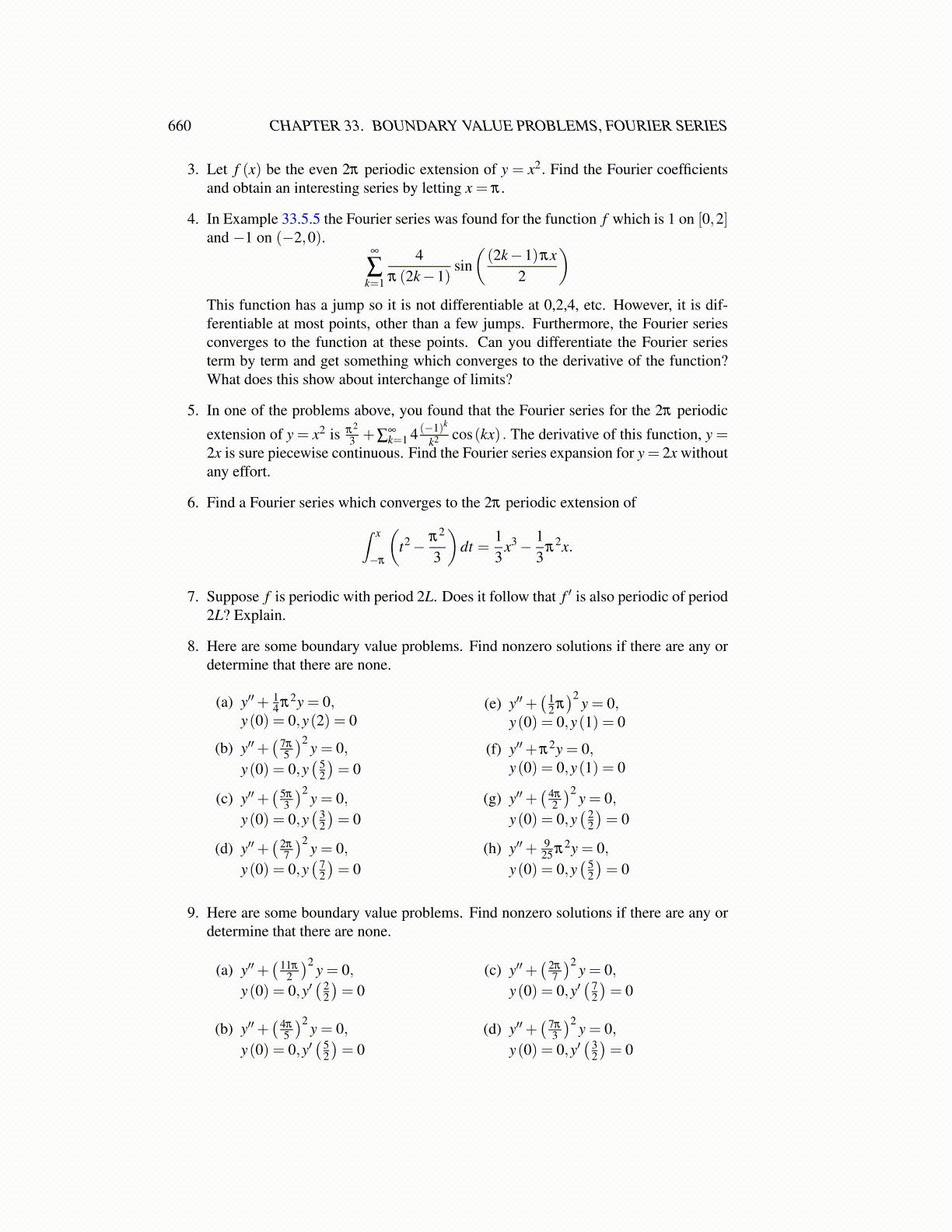
660 CHAPTER 33. BOUNDARY VALUE PROBLEMS, FOURIER SERIES
3. Let f (x) be the even 2π periodic extension of y = x2. Find the Fourier coefficientsand obtain an interesting series by letting x = π .
4. In Example 33.5.5 the Fourier series was found for the function f which is 1 on [0,2]and −1 on (−2,0).
∞
∑k=1
4π (2k−1)
sin((2k−1)πx
2
)This function has a jump so it is not differentiable at 0,2,4, etc. However, it is dif-ferentiable at most points, other than a few jumps. Furthermore, the Fourier seriesconverges to the function at these points. Can you differentiate the Fourier seriesterm by term and get something which converges to the derivative of the function?What does this show about interchange of limits?
5. In one of the problems above, you found that the Fourier series for the 2π periodic
extension of y = x2 is π2
3 +∑∞k=1 4 (−1)k
k2 cos(kx) . The derivative of this function, y =2x is sure piecewise continuous. Find the Fourier series expansion for y = 2x withoutany effort.
6. Find a Fourier series which converges to the 2π periodic extension of∫ x
−π
(t2− π2
3
)dt =
13
x3− 13
π2x.
7. Suppose f is periodic with period 2L. Does it follow that f ′ is also periodic of period2L? Explain.
8. Here are some boundary value problems. Find nonzero solutions if there are any ordetermine that there are none.
(a) y′′+ 14 π2y = 0,
y(0) = 0,y(2) = 0
(b) y′′+( 7π
5
)2y = 0,
y(0) = 0,y( 5
2
)= 0
(c) y′′+( 5π
3
)2y = 0,
y(0) = 0,y( 3
2
)= 0
(d) y′′+( 2π
7
)2y = 0,
y(0) = 0,y( 7
2
)= 0
(e) y′′+( 1
2 π)2
y = 0,y(0) = 0,y(1) = 0
(f) y′′+π2y = 0,y(0) = 0,y(1) = 0
(g) y′′+( 4π
2
)2y = 0,
y(0) = 0,y( 2
2
)= 0
(h) y′′+ 925 π2y = 0,
y(0) = 0,y( 5
2
)= 0
9. Here are some boundary value problems. Find nonzero solutions if there are any ordetermine that there are none.
(a) y′′+( 11π
2
)2y = 0,
y(0) = 0,y′( 2
2
)= 0
(b) y′′+( 4π
5
)2y = 0,
y(0) = 0,y′( 5
2
)= 0
(c) y′′+( 2π
7
)2y = 0,
y(0) = 0,y′( 7
2
)= 0
(d) y′′+( 7π
3
)2y = 0,
y(0) = 0,y′( 3
2
)= 0